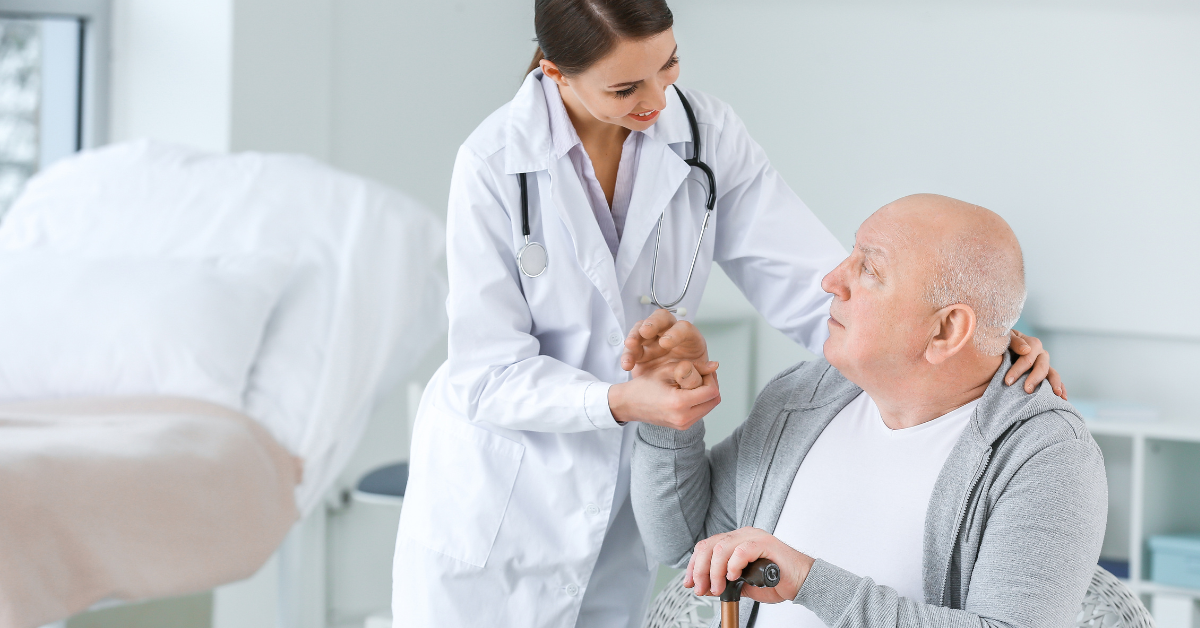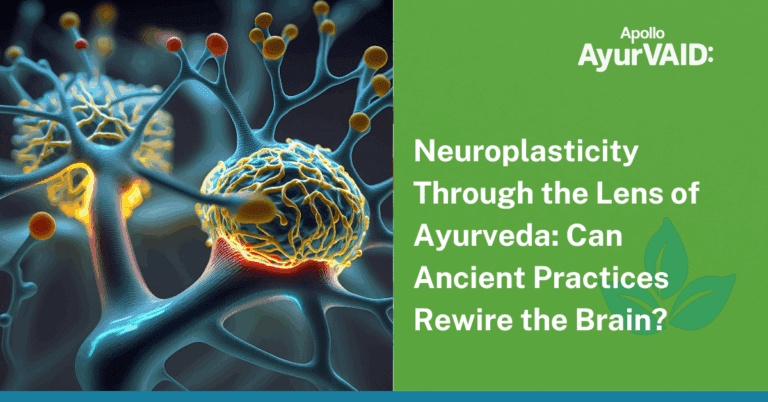Introduction
The first time you meet someone with early-stage Parkinson’s, you might not notice their tremors. Instead, you see the hesitation—the careful grip on a teacup, the pause before standing. Parkinson’s Disease isn’t just about tremors; it’s a neurodegenerative disorder that causes gradual loss of effortless movement. For many, the biggest challenge isn’t stiffness or shaking, but the increasing reliance on Levodopa and its side effects- motor fluctuations, dyskinesias, and dystonia.
Ayurveda for Parkinson’s Disease offers a whole-person approach that provides symptomatic relief, slows progression, and enhances quality of life. This World Parkinson’s Day, let’s explore how Ayurvedic treatment for Parkinson’s Disease can help address the full spectrum of symptoms while optimising the benefits of levodopa.

Parkinson’s Disease: More Than Just Tremors
We often reduce Parkinson’s to a set of symptoms: tremors, slow movement, and stiffness. But it’s more than that. It’s the sudden struggle with buttoning the shirt that was once effortless. The exhaustion from a short walk. The unsettling slowness of a once-expressive face.
Most people don’t realize that by the time these Parkinson’s Disease symptoms appear, the damage has already been building up for years. Parkinson’s Disease is caused by the loss of dopamine-producing neurons in the brain. It is a slow process, and when it reaches a critical point, the body begins to show signs that can no longer be ignored.
The gut, the sleep cycle, the mind – everything is affected. A Parkinson’s patient may experience years of constipation before they ever notice a tremor. They may feel a deep, unexplained fatigue that no amount of rest can fix. Their handwriting shrinks, their voice softens. Even emotions shift – anxiety, apathy, or depression often settle in quietly alongside the physical symptoms.
Many patients feel as though their body is betraying them. However, understanding these Parkinson’s Disease symptoms is the first step toward effective management and prevention.
Causes of Parkinson’s
According to Ayurveda, Parkinson’s Disease is caused by aggravated Vata, affecting the Majja Dhatu (nervous system) and Srotas (subtle channels). These imbalances are interestingly said to originate in Koshtha (the gut), as neurological disorders are believed to be rooted in disturbed Vata in the digestive system. This is the reason that a gut imbalance is an early alarm sign. Let us explore Parkinson’s Disease causes:
- Genetic Factors: Mutation of gene GBA1 may potentiate the risk for Parkinson’s Disease, especially when combined with other factors such as age and environment.
- Environmental Toxins: Pesticides and herbicides can damage dopamine-producing brain cells and increase the risk of Parkinson’s Disease.
- Age: Parkinson’s is seen in the elderly, usually above the age of 60, with a greater prevalence rate among men.
- Injuries and Infections: Multiple head injuries lead to chronic inflammation and neurodegeneration, increasing the risk of Parkinson’s Disease due to the destruction or disruption of dopamine-producing brain cells.
Can Ayurveda Help Slow Parkinson’s Progression?
Conventional medicine has given us dopamine replacement therapy—Levodopa being the most well-known. It helps, but it’s not a cure. Over time, the body adapts, needing higher doses, and patients often struggle with fluctuations—feeling better one moment and suddenly stiff the next.
This is where a more integrative approach becomes crucial. Ayurveda for Parkinson’s Disease does not include only medications but a way of life that supports the nervous system and slows the progression of the disease.
Ayurveda, which has always viewed diseases as systemic imbalances rather than isolated issues, has long recognized a condition resembling Parkinson’s – Kampavata. Following this evidence-based approach, Parkinson’s treatment at Apollo AyurVAID lays emphasis not only on reducing the symptoms but also on nourishing the nervous system, restoring gut health, and balancing the underlying causes of deterioration. At Apollo AyurVAID, Parkinson’s Disease treatment in Ayurvedic medicine includes a three-stage systematic approach:
1. Poorvakarma (Preparatory Steps)
- Medicines that help reduce Ama (Inflammation) and improve Agni (Digestive Fire)
- Rookshana (Drying) therapies to reduce aggravated Kapha
- Snehana (Oleation Therapy) to reduce rigidity and tremors and enhance flexibility.
- Snehapana (Internal administration of medicated ghee) nourishes the nervous system, supports brain function, and relieves constipation.
- Swedana (Steam Therapy) for relaxing muscles, alleviating stiffness, and preparing tissues for the primary procedures.
2. Pradhanakarma (Main Procedures)
- Vasti (Enemas) for addressing gut-brain axis dysfunction, balance Vata, empty the bowel, and relieve constipation accompanying PD.
- Anuvasana Vasti (Oil-based enema) to nourish the nerves.
- Niruha Vasti (Decoction-based enema) to detoxify and balance Vata.
- Nasya (Nasal instillation) with neuroprotective herbs for cognitive enhancement and relief from motor symptoms.
- Virechana (Purgation) to displace toxic factors from the body, balance Vata Dosha, and improve neurological functioning.
- Shirodhara (Oil or decoction stream over forehead) for improvement in mental and cognitive well-being, reducing anxiety, depression, and hallucination symptoms with PD.
- Paschatkarma (Post-Treatment Care)
- Medhya Rasayanas (Brain Tonics) that have neuroprotective properties help sharpen memory, support cognitive functions, reduce stress, improve neuronal health, and improve neuronal health.
Along with therapies and treatments, a Vata-balancing diet, exercise, and a healthy sleep routine help in delaying the progression of Parkinson’s Disease by optimising the levodopa therapeutic window.
This World Parkinson’s Day, let’s go beyond awareness and focus on real solutions. Ayurveda offers a holistic path to managing Parkinson’s Disease and improving quality of life. If you’re looking for expert guidance, consult Apollo AyurVAID’s specialists for a personalized Ayurveda approach to Parkinson’s treatment.

References
Pathak-Gandhi N, Vaidya AD. Management of Parkinson’s disease in Ayurveda: Medicinal plants and adjuvant measures. J Ethnopharmacol. 2017 Feb 2;197:46-51.
![]()
Mridula Chaturvedi, Abhishek Kumar Chaturvedi; Recent Advancement in the Treatment of Neurodegenerative Diseases by Ayurveda, Recent Advances in the Treatment of Neurodegenerative Disorders (2021) 1: 11.
![]()
Gerson S. The Ayurvedic approach to Parkinson’s disease (Kampavata) [Internet]. Gerson Institute of Ayurvedic Medicine; 2019 Feb 12 [cited 2025 Mar 3].
![]()
Castilla-Cortázar Larrea, Inma & Aguirre, Gabriel & Femat-Roldán, Giovana & Martín Del Estal, Irene & Espinosa, Luis. (2020). Is insulin-like growth factor-1 involved in Parkinson’s disease development? Journal of Translational Medicine.
![]()
S Suraksha, S J Lolashri, Kiran M Goud. Ayurvedic management of Parkinson’s disease – A Case Study. J Ayu Int Med Sci. 2023;8(1):194-200.
![]()






